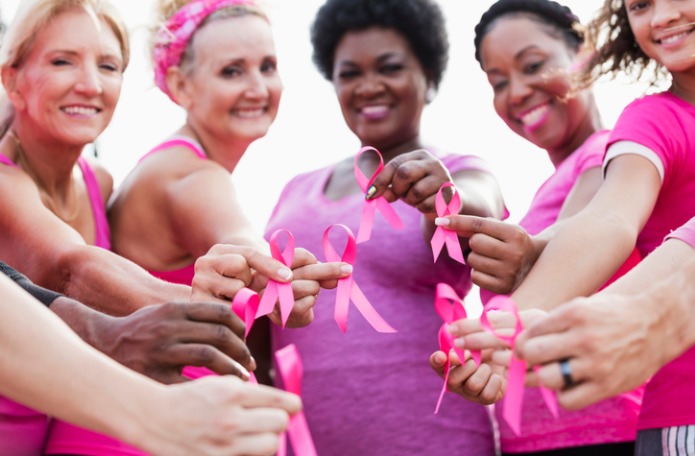October is National Breast Cancer Awareness month. 1 in 8 women will be diagnosed with breast cancer in their lifetime. It is the second leading cause of cancer death among women. This year, over 250,000 women will be diagnosed with breast cancer. The good news is that when detected early, breast cancer can be treated more successfully, increasing the chances for survival.
Breast cancer begins when normal cells in the breast start to grow out of control. The cells typically form a tumor, which can usually be felt as a lump or viewed on an x-ray. The tumor becomes cancer if the cells begin to spread to surrounding tissues or other parts of the body. Please keep in mind that most breast lumps are not cancerous (benign), but it is important to have any lump or breast change checked by a health care professional.
Breast Cancer and Excess Weight:
Carrying excess weight has been linked to a number of health issues including breast cancer. Studies show women who are overweight or obese have a higher risk of being diagnosed with breast cancer compared to women who maintain a healthy weight, especially after menopause. Being overweight can also increase the risk of breast cancer recurrence in women who have had the disease.
Women who are overweight or obese after menopause have a 30% to 60% higher breast cancer risk than those who are lean. One reason for this is that fat cells make estrogen; extra fat cells mean more estrogen in the body, and estrogen can make hormone-receptor-positive breast cancers develop and grow. Still, the link between extra weight and breast cancer is complicated and affected by other factors. For example, the location of the extra weight matters. Extra fat around your belly may increase risk more than the same amount of extra fat around your thighs or hips.
Adult weight gain may also increase the risk of breast cancer before and after menopause. One large study found that women who gained about 20 pounds after age 18 had a 15% higher risk of breast cancer compared to women who gained little or no weight. Those who gained 55 pounds or more had a 45% higher risk.
Other Risks:
-
Lack of physical activity: Studies have shown that regular physical activity reduces breast cancer risk, particularly in women past menopause. This may be due to the fact that activity helps regulate body weight, reduces inflammation, and helps to balance hormones, and increases overall energy. The American Cancer Society recommends at least 150 minutes of moderate intensity or 75 minutes of vigorous intensity activity weekly for all adults. The best benefits are found when these minutes are spread throughout the week.
-
Alcohol Consumption: Women who consume 2 to 3 drinks daily that contain alcohol, have a 20% higher risk of breast cancer, than those women who do not drink alcohol. For women who do drink alcohol, it is recommended to limit to no more than 1 serving daily.
-
Birth Control: Many studies have concluded that women who are on oral contraceptives have a slightly increased risk for developing breast cancer.
How to Lower Risk:
There is no 100% sure way to prevent breast cancer. However, there are things women can do to help lower their overall risk.
-
Achieve and maintain a healthy weight.
-
Incorporate daily activity.
-
Limit alcohol.
-
Know how your breasts normally look and feel.
-
Perform monthly self breast exams.
-
Have regular mammograms. Mammograms help detect breast cancer at an early stage. Here are the current recommendations:
-
-
Women between 40-44 should have the option to start screening yearly.
-
Women 45-54 should have annual mammograms.
-
Women 55 and older can start every other year, or can decide to continue yearly.
-
We at Blue Sky MD know that losing weight can be difficult especially as you age. But, with deliberate changes to your diet along with regular exercise, weight loss is achievable. This October, decrease your risk of breast cancer by making an appointment with Blue Sky MD and start your weight loss journey today.






